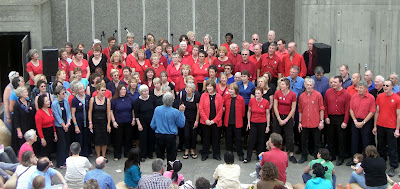What could be more true to the spirit of Christmas than standing in a crowded pub and singing Christmas carols?

Especially if the tunes are only to be heard in a few towns and villages near Sheffield, in South Yorkshire.
What could be more true to the spirit of Christmas than standing in a crowded pub and singing Christmas carols?

Especially if the tunes are only to be heard in a few towns and villages near Sheffield, in South Yorkshire.
We’ve all been there: a big concert is coming up and we feel under-prepared.

Should we just duck out, or soldier on and busk it? Here’s what I think.
This is one of a series of summary posts around a specific topic, bringing together five relevant posts from the past.

This summary is all about looking after your voice, especially in the winter months or when you have a busy concert season or if feasting is involved.
I started this blog way back in December 2006. That’s 17 years of weekly blog posts!

I thought I’d make a little video to let you know why and how I got started.
I’m not in the mood to write this blog today. But I need to.

How can you get on with things when you’re just not in the mood?
Many choirs charge their members as and when they turn up: a pay as you go system.

But there are disadvantages to that approach, so other choirs operate a lump sum in advance system. Let’s look at the pros and cons of these and which might suit your choir best.
The term ‘community choir’ is used a lot, but what does it actually mean?

There is no single definition, but I thought I’d look at some common characteristics.
Not everyone likes to sing in harmony with others, but those who do are often really nice people.

Why is that? And is it a universal truth?
I’ve written over 900 articles on this blog since I started in December 2006.

That’s a lot of information to wade through! Here’s a short guide to help you find what you’re looking for.
We all want audiences at our concerts, so we have to let people know about them.

I’ve seen so many bad examples of concert publicity recently, I thought I’d write a few tips.
I am a member of the Natural Voice Network and all my work is based on their ethos.

But what exactly is ‘Natural Voice’ and how do Natural Voice choirs differ from other kinds of choir?
Most choirs get to the point where they want to share the songs they’ve learnt with an audience.

But how do you know that the songs are in a good enough state to share?
Everybody talks about the importance of warming up and properly preparing to sing before each rehearsal.

But what about ending a rehearsal? Not as much attention is paid to that. How do we end so singers go away feeling great?
It’s easy to forget, especially when preparing for a concert, that singers come each week to have a good old sing.

They don’t want to be learning new material all the time or focusing on vocal development.
I often come across choir leaders asking for “men’s songs” for the men in their choirs.

It make me wonder: is there a difference between “men’s songs” and “women’s songs” and what does that even mean?
Very occasionally there comes a time when you will have to ask a singer to leave your choir.

What’s the best (and kindest) way to do this?
Familiarity breeds contempt. If you do the same thing over and over again it can become boring.

However, constantly introducing new things can be hard work and it can feel like you never arrive. How do we maintain a balance between these two extremes?
People often ask how much they should charge for leading a workshop or concert.

They usually focus on the professional fee for the contact hours, but forget any travel time involved.
I always thought I ran friendly, welcoming choirs (see How welcoming is your choir?). There was always someone around to buddy new members so they wouldn’t feel left out.

But then one day, a new member said to me that standing around in the break felt like being the new kid in the playground at school.
I like to outsource elements of my teaching practice when leading singing days.

I allow the singers to put chairs out (or not), and to decide how they want to stand. Often, it ends up being a circle. But is that the best way to sing as a group?
I’ve written before about How to know how loud you should sing in a choir.

But as a choir member you are working as part of a team, so it’s not entirely up to you. It’s all about balance.
I’ve pointed out before that too much thinking is bad for singers. See The curse of confusion: why thinking is bad for singing.

In fact, your mouth knows far more than your brain does when it comes to songs!
No matter how well you plan your singing workshop or performance, you can find yourself with an unexpected slot that needs filling.
Which is why you should always have a spare song or two up your sleeve.
I give an introductory pep talk at the start of all my singing workshops.
.JPG)
The aim is to give out useful information, but also to reassure and relax the singers.
I give an introductory pep talk at the start of all my singing workshops.
.JPG)
The aim is to give out useful information, but also to reassure and relax the singers.
I give an introductory pep talk at the start of all my singing workshops.
.jpg)
The aim is to give out useful information, but also to reassure and relax the singers.
I give an introductory pep talk at the start of all my singing workshops.
.jpg)
The aim is to give out useful information, but also to reassure and relax the singers.
I usually try not to use lyric sheets at all. I’d rather have singers with their heads up, watching me and each other.

But sometimes, if a song is in a foreign language, or has lots of words, I’ll put lyrics up.
Whether singer or choir leader, your choir can’t do without you. You are what makes it.

Yet, at the same time, you can be replaced. You are not indispensable.
I’m a big procrastinator. I leave everything until the last minute. If I didn’t have deadlines, I would never get anything done!

But I’ve come to realise that this is my way of working and it has good results. Here’s why procrastination is not necessarily a bad thing.
A little stress can be good for us. It helps us to get things done or to focus on something that needs our attention.

But too much stress can affect our mood, our body and our relationships. How can we put on a successful singing event without getting too stressed out?
This is a series of five posts looking in a light-hearted way at the different types of singers in a typical community choir.

You might have thought that SATB choirs (Soprano, Alto, Tenor, Bass) have just four different voice sections, but you’d be wrong. There is a fifth section known as the Floaters (or Flexitarians).
This is a series of five posts looking in a light-hearted way at the different types of singers in a typical community choir.

I've covered Sopranos, Altos and Tenors. For the last SATB section, here are the Basses. Enjoy! In my final post I deal with Floaters.
This is a series of five posts looking in a light-hearted way at the different types of singers in a typical community choir.

I've covered Sopranos and Altos so far, now here are the Tenors. Enjoy! In other posts I deal with Basses, and Floaters.
This is a series of five posts looking in a light-hearted way at the different types of singers in a typical community choir.

Last week it was the Sopranos, now here are the Altos. Enjoy! In other posts I deal with Tenors, Basses, and Floaters.
This is a series of five posts looking in a light-hearted way at the different types of singers in a typical community choir.

First up are the Sopranos. Enjoy! In other posts I deal with Altos, Tenors, Basses, and Floaters.
As singers and choir leaders we grow and develop skills over time. We leave behind us things we consider to be only for beginners.

But no matter how elementary something is, we can always learn something new by revisiting it.
Many choir leaders hand out sheet music or lyric sheets to their singers when teaching a song.

But does this do more harm than good? Is it better to learn the lyrics by ear?
Sometimes a performance is a blinder. There is a standing ovation and cries for more.

And yet … it is possible to come away feeling that it’s all gone wrong. How is this possible?
If you’re new to the choral world, you might find some of the terms used a bit unfamiliar.

Don’t worry, I’m here to help! Here’s a glossary of some of the more common choral jargon.
Last week I wrote about the notion of being “good enough” and how it could be applied to choir leaders: The good enough choir leader.

This week I want to look at how singers can usefully use this idea.
We all aim to do the best we can. But if we wait until we’re perfect, we’ll never get anything done!

It’s OK to be “good enough” at what we do. Here’s why.
It is human nature for our heads to go up and down as we sing extreme notes.

If a note is very high, we tilt our head up to reach for it. If a note is very low, we tip our head down. Unfortunately, that doesn’t help us to reach those notes. In fact it makes things worse.